News & Media
"We must act together to build a brighter future"
The 12th Annual Thabo Mbeki Africa Day Lecture took stock of what the African Union (AU) has achieved since its launch in 2002, two decades ago this year.
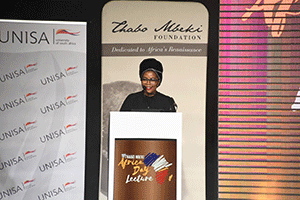
Prof Puleng LenkaBula, Principal and Vice-Chancellor of Unisa
In her welcome address, Prof Puleng LenkaBula, Principal and Vice-Chancellor of Unisa, said: "We stand highly indebted to President Thabo Mbeki for notable efforts in keeping the Pan African dream of our forebears alive amidst the constant barrage of mammoth challenges." LenkaBula added that Mbeki's invitation to rethink and reimagine Africa and the AU was an important invitation for all of us in society, including institutions of higher learning, to affirm the strategic repositioning of the AU.
In his welcome address, Former President Mbeki said: "To say where we are concerning fulfilling everything we promised ourselves twenty years ago is a challenging topic. However, it is important for the AU to reflect on the question and say: 'This is where we were twenty years ago. This is where we are now, and where we want to be in ten years'. I think this is important because all of us can see the challenges that face us as Africans."
The African Union at twenty
Delivering the keynote address was Prof Toyin Falola, an African and global intellectual legend. Opening his address with a Yoruba adage, he said: "A heavy basket cannot be lifted to the head with one hand. I remember this adage whose loose meaning is that one can only boast of a collective and cooperative front because an individual effort makes one susceptible to attacks and challenges." He added: "In English, we also say, 'united we stand, divided, we fall'. While there are variants of this adage, the point is that collective effort leads to greater success, and I think this is the foundation of the AU."
Falola expressed that the AU is evidence of a paradigm shift in continental ideology. "The African dream took on a more profound continental shape when African countries came together to plan how to achieve independence across all sectors of African life and socioeconomic development," he said.
"Before the AU," explained Falola, "the Organisation of African Unity (OAU) attempted to promote African unity and economic independence by upholding unique African social attributes and economic progress among all constituting members. The history of the AU is well known to us, and in our evaluation of it, we would not be mistaken to assert that the union has tried to be true to its course and, to a certain extent, has not been fully negligent of its core duties."
However, the swing of necessity shifted in 2001 when the OAU took decisive steps to refocus its objectives and structures to accommodate contemporary matters affecting Africa and the renewal of developmental strategies to match current realities. Therefore, the AU was founded following a two-year process of thorough analyses of the former entity (the OAU) and everyday situations on the continent. Since then, the AU has taken on a new duty different from achieving independence from European colonial rule and has tried to become more focused on preserving democratic principles.
The African Union's objectives and achievements
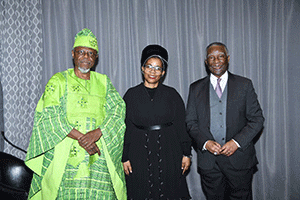
Prof Toyin Falola, Prof Puleng LenkaBula and Former President Thabo Mbeki
The AU set out as a symbol of hope for the renewed aspirations of Pan-Africanism and a better positioning of the continent across all sections. Falola said: "To define the union's mission, it developed some fourteen objectives for itself which included guiding principles that would be material in realising the objectives." He added that the union's duties had the development of Africa and its member-states as core, the creation of an African Economic Community, ensuring good and uninterrupted governance, promotion of justice and equality, and development across health and other essential sectors.
"It is important to ask if the AU has been fulfilling the objectives and principles it set out to do," continued Falola. "Has it achieved what the OAU had achieved during the same period, or could we comfortably assert that the union can boast of more than the achievements of the OAU within 39 years of its existence?"
He argued further that a concerted effort toward economic growth has been one of the most important objectives of the AU in recent times. "Unfortunately, the African population still constitutes one of the poorest in the world, with about 400 million Africans living under the poverty line of $1.96 a day. The economic growth of the continent has neither been inclusive nor uniform, and as such, the quality of life of the citizens is in a pitiful state," he argued.
While almost every country in Africa is faced with economic challenges, Falola further argued that it would be wrong and inconsiderate to posit that the union had not been doing much to achieve the most within the period it had been founded. He argued that the economic growth pattern of the continent could be attributed to many factors, part of which is a laudable open trade system. In this regard, Falola argued that the AU has announced and adopted industrialisation as the most vital and progressive developmental strategy on many occasions.
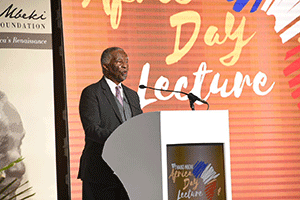
Former President and Unisa Chancellor, Thabo Mbeki
"To encourage continuous industrialisation, the AU introduced the African Continental Free Trade Area, designed to affect about 1.2 billion Africans with a gross domestic product of $2.5 trillion," said Falola. "In achieving better economic growth for the continent, the union has been in partnership with individual countries and sub-regional organisations to put its economic development plans in motion."
Falola argued that to reduce the poverty rate in the continent continually, Africa must be ready to harness resources that are original to it.
Towards Achieving Agenda 2063
Falola said that for the past twenty years, the AU has recorded commendable achievements, failed noticeably, and battled recurrent and momentary challenges. "The union has gone through transformational processes that have been able to make it adjust its orientation towards the current needs of the continent," he said. He added that while there might be concerns about the past and current actions of the AU, we must always be ready to draw back and ask if the AU has a plan for the future. "Unsurprisingly, the AU has been able to reel out plans covering the continent's current and future challenges. The Agenda 2063 is one of such futuristic agreements and subscriptions that the African nations have decided to execute," said Falola.
To conclude, Falola borrowed from Mbeki's address at the launch of the AU in 2002: "We must act together to build a brighter future, working together with all of us – governments, parliamentarians, trade unions, private sector, civil society, religious communities, cultural workers – for a better future for the people of Africa."
To watch the lecture, click here.
* By Tshimangadzo Mphaphuli, Acting Editor: Internal Publications, Department of Institutional Advancement
Publish date: 2022-06-02 00:00:00.0

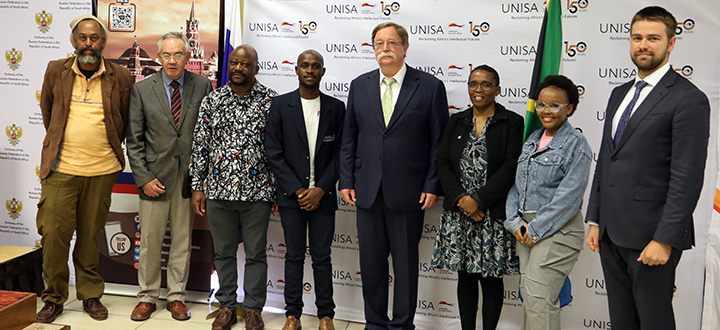 Unisa's student leadership engage with Russian ambassador
Unisa's student leadership engage with Russian ambassador
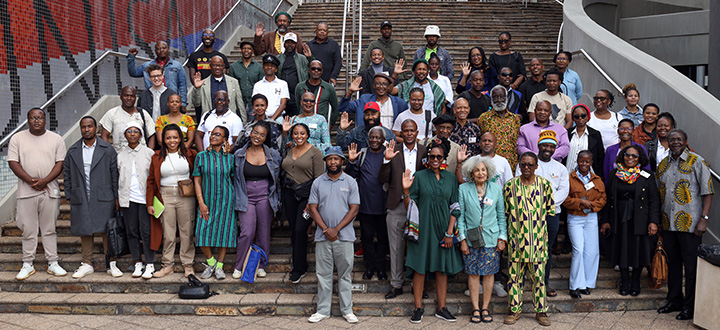 Re-igniting and re-imagining Pan Africanism, Afrocentricity and Afrofuturism in the 21st century
Re-igniting and re-imagining Pan Africanism, Afrocentricity and Afrofuturism in the 21st century
 Young Unisa science stars join elite Lindau Nobel Laureate group
Young Unisa science stars join elite Lindau Nobel Laureate group
 Education MEC addresses Unisa autism seminar
Education MEC addresses Unisa autism seminar
 Seven Unisans nominated for the NSTF-South32 Awards 2023/2024
Seven Unisans nominated for the NSTF-South32 Awards 2023/2024